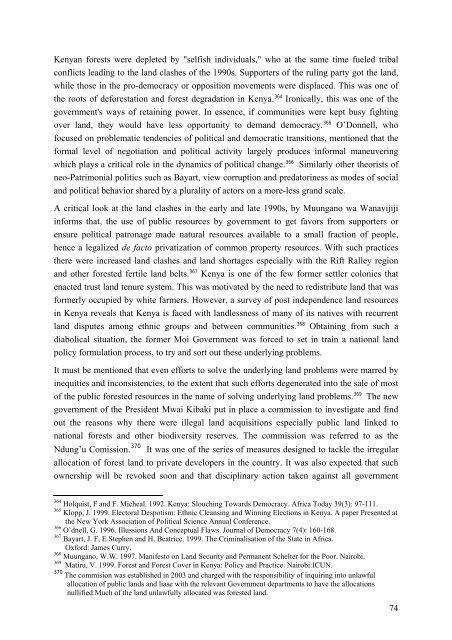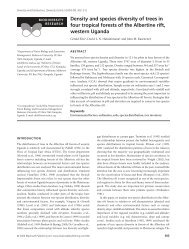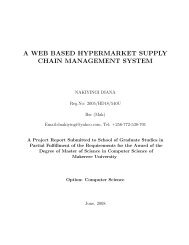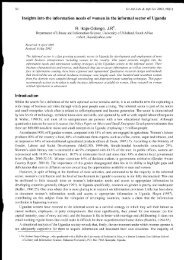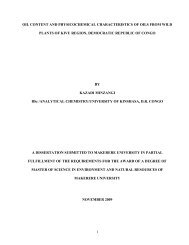THE UNIVERSITY OF LEIPZIG
THE UNIVERSITY OF LEIPZIG
THE UNIVERSITY OF LEIPZIG
You also want an ePaper? Increase the reach of your titles
YUMPU automatically turns print PDFs into web optimized ePapers that Google loves.
Kenyan forests were depleted by "selfish individuals," who at the same time fueled tribal<br />
conflicts leading to the land clashes of the 1990s. Supporters of the ruling party got the land,<br />
while those in the pro-democracy or opposition movements were displaced. This was one of<br />
the roots of deforestation and forest degradation in Kenya. 364 Ironically, this was one of the<br />
government's ways of retaining power. In essence, if communities were kept busy fighting<br />
over land, they would have less opportunity to demand democracy. 365 O’Donnell, who<br />
focused on problematic tendencies of political and democratic transitions, mentioned that the<br />
formal level of negotiation and political activity largely produces informal maneuvering<br />
which plays a critical role in the dynamics of political change. 366 Similarly other theorists of<br />
neo-Patrimonial politics such as Bayart, view corruption and predatoriness as modes of social<br />
and political behavior shared by a plurality of actors on a more-less grand scale.<br />
A critical look at the land clashes in the early and late 1990s, by Muungano wa Wanavijiji<br />
informs that, the use of public resources by government to get favors from supporters or<br />
ensure political patronage made natural resources available to a small fraction of people,<br />
hence a legalized de facto privatization of common property resources. With such practices<br />
there were increased land clashes and land shortages especially with the Rift Ralley region<br />
and other forested fertile land belts. 367 Kenya is one of the few former settler colonies that<br />
enacted trust land tenure system. This was motivated by the need to redistribute land that was<br />
formerly occupied by white farmers. However, a survey of post independence land resources<br />
in Kenya reveals that Kenya is faced with landlessness of many of its natives with recurrent<br />
land disputes among ethnic groups and between communities. 368 Obtaining from such a<br />
diabolical situation, the former Moi Government was forced to set in train a national land<br />
policy formulation process, to try and sort out these underlying problems.<br />
It must be mentioned that even efforts to solve the underlying land problems were marred by<br />
inequities and inconsistencies, to the extent that such efforts degenerated into the sale of most<br />
of the public forested resources in the name of solving underlying land problems. 369 The new<br />
government of the President Mwai Kibaki put in place a commission to investigate and find<br />
out the reasons why there were illegal land acquisitions especially public land linked to<br />
national forests and other biodiversity reserves. The commission was referred to as the<br />
Ndung’u Comission. 370 It was one of the series of measures designed to tackle the irregular<br />
allocation of forest land to private developers in the country. It was also expected that such<br />
ownership will be revoked soon and that disciplinary action taken against all government<br />
364 Holquist, F and F. Micheal. 1992. Kenya: Slouching Towards Democracy. Africa Today 39(3): 97-111.<br />
365 Klopp, J. 1999. Electoral Despotism: Ethnic Cleansing and Winning Elections in Kenya. A paper Presented at<br />
the New York Association of Political Science Annual Conference.<br />
366 O’dnell, G. 1996. Illussions And Conceptual Flaws. Journal of Democracy 7(4): 160-168.<br />
367 Bayart, J. F, E.Stephen and H. Beatrice. 1999. The Criminalisation of the State in Africa.<br />
Oxford: James Curry.<br />
368 Muungano, W.W. 1997. Manifesto on Land Security and Permanent Schelter for the Poor. Nairobi.<br />
369 Matiru, V. 1999. Forest and Forest Cover in Kenya: Policy and Practice. Nairobi:ICUN.<br />
370 The commision was established in 2003 and charged with the responsibility of inquiring into unlawful<br />
allocation of public lands and liase with the relevant Government departments to have the allocations<br />
nullified.Much of the land unlawfully allocated was forested land.<br />
74


